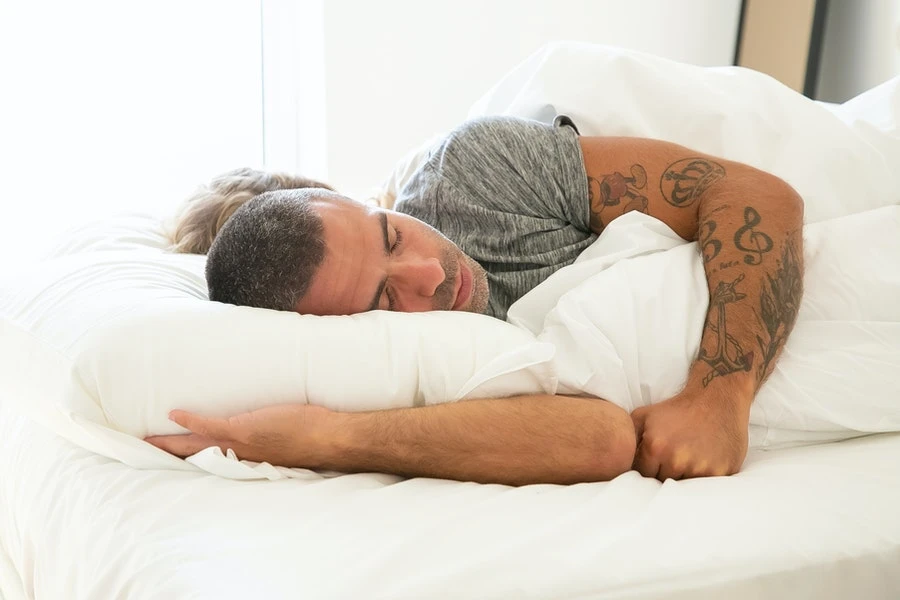
Do you often find yourself struggling to get a good night’s sleep? If so, you’re not alone. Millions of people around the world suffer from sleep deprivation. There are many reasons why people have difficulty sleeping, including stress, anxiety, and emotional turmoil.
Thankfully, there are natural remedies that can help support better sleep routines. Today, join us as we will discuss some of the best holistic wellness techniques to promote restful slumber.
What Is Sleep Deprivation And Its Symptoms?
Sleep deprivation is a condition that occurs when you don’t get enough sleep. It can be acute, which means it lasts for a short time, or chronic, which means it happens over a long period. Sleep deprivation can cause various physical and mental symptoms, such as:
- Fatigue: You feel tired and drowsy during the day.Irritability: You may find yourself getting angry or agitated more easily.
- Impaired judgment: You may have trouble making decisions or solving problems.
- Inattention: You may have difficulty focusing or paying attention.
- Moodiness: You may feel more cranky or emotional than usual
- Irritability: You may find yourself getting angry or agitated more easily.
- Headaches: You may experience headaches or migraines.
- Digestive problems: You may have trouble with your digestive system, such as constipation or diarrhea.
Sleep deprivation can also lead to more serious health problems, such as obesity, diabetes, and heart disease.There are many reasons why people have difficulty sleeping. Some sleep disorders, such as sleep apnea and restless legs syndrome, can make it hard to get a good night’s sleep.
What Is Sleep Apnea?
Sleep apnea is a sleep disorder that causes pauses in your breathing or shallow breaths while you sleep. These pauses can last for a few seconds to minutes and can happen up to 30 times or more an hour.
Sleep apnea can cause snoring, gasping for air during sleep, and daytime fatigue. It can also lead to more serious health problems, such as high blood pressure, heart disease, and stroke. If you think you might have sleep apnea, talk to your doctor.
What Is Restless Legs Syndrome?
Restless legs syndrome (RLS) is a sleep disorder that causes an irresistible urge to move your legs. The urge is often worse when you’re lying down or sitting for long periods. Moving your legs may relieve the urge temporarily, but it usually comes back. RLS can also cause tingling, burning, or aching sensations in your legs.
If you have RLS, you may have difficulty falling asleep or staying asleep. You may also feel tired during the day. RLS can lead to sleep deprivation, which can cause other health problems. Talk to your doctor if you think you might have RLS.
Tips For Getting A Good Night’s Sleep
There are many things you can do to promote better sleep. Some simple tips include:
- Establishing a regular sleep schedule: Go to bed and wake up at the same time every day, even on weekends. This will help train your body to sleep better.
- Creating a relaxing bedtime routine: Do something calming before bed, such as reading or taking a bath. This will help signal to your body that it’s time to sleep.
- Keeping a cool, comfortable sleep environment: Make sure your bedroom is dark, quiet, and cool. A warm environment can make it harder to sleep.
- Limiting caffeine and alcohol: Caffeine and alcohol can disrupt sleep, so avoid them in the evening.
- Avoiding nicotine: Nicotine is a stimulant that can make it hard to sleep. If you smoke tobacco, consider quitting.
- Exercising regularly: Exercise can help improve sleep quality. Just be sure to avoid exercising close to bedtime as it may make it harder to fall asleep.
There are also natural remedies that can help support better sleep. Some of these include:
- Valerian Root: This herb has been used for centuries to promote sleep. It’s thought to work by increasing levels of a chemical called gamma aminobutyric acid (GABA) in the brain. GABA helps regulate sleep and anxiety.
- Chamomile: This herb is often taken as tea before bedtime. Chamomile is thought to contain compounds that can promote sleepiness and relieve anxiety.
- Lavender: Lavender oil is often used in aromatherapy to promote relaxation. It’s thought to have calming effects on the nervous system.
Natural remedies are a great way to support better sleep without the use of medication. Even more convenient are when these natural remedies are used in a sleep patch. If you’re struggling with sleep, talk to your doctor about some of the natural remedies listed above. They may be able to help you get the restful sleep you need.
Emotional Wellness: A Key to Better Sleep
It’s no secret that emotional wellness plays a role in sleep. If you’re dealing with stress or anxiety, it can be difficult to fall asleep and stay asleep. That’s why it’s important to find ways to promote emotional wellness. Some techniques that can help include:
- Meditation: Meditation can help you focus on the present moment and let go of worries or concerns that might be keeping you up at night.
- Yoga: Yoga is a great way to reduce stress and promote relaxation. Many different yoga poses can help you wind down before bedtime.
- Breathing exercises: Breathing exercises can also help you relax and fall asleep more easily.
- Journaling: Writing in a journal before bed can help you release any pent-up emotions that might be causing sleep problems.
We hope this article has given you some helpful tips for promoting better nighttime slumber. If you’re struggling with sleep, try incorporating some of these emotional wellness techniques into your nightly routine. You may be surprised at how much they help!




















